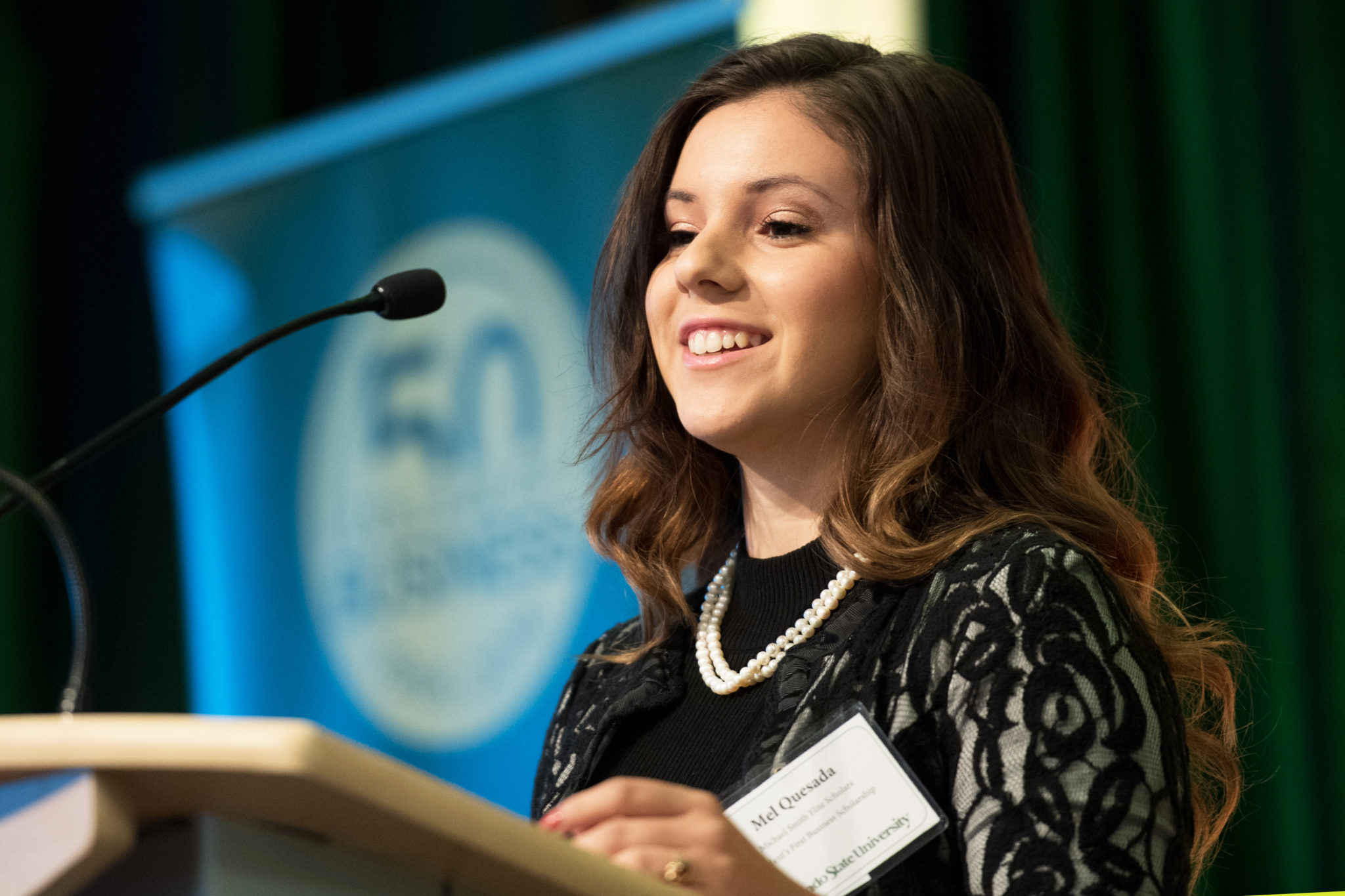
A story of scholarship
As plates and glasses clinked during the College of Business’s annual scholarship luncheon, Melissa Quesada, a freshman with hopes of becoming a corporate lawyer, walked up to the podium.
Shuffling through a handful of notes, she looked into the lights and crowd and flashed a smile to the hundreds of people waiting to hear her story.
Her journey to become a business scholar at Colorado State University has a joyful ending, but it didn’t start that way.
A life-changing moment
“It’s a little easier to talk about now,” Quesada said.
However, four years earlier, as hardship began to crash down on her family, Quesada was struggling.
“My dad was diagnosed with stomach cancer my freshman year of high school,” said Quesada.
He beat the cancer, but it came back just a few years later.
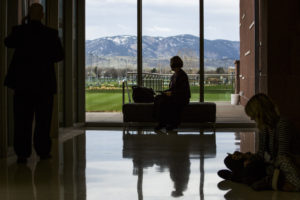
Quesada started working 40 hours per week, saving money for college and covering the expenses for her International Baccalaureate exams, business extracurriculars, and even prom, while balancing school and helping support her father through his illness.
She would study during meals, before school, or when things slowed down enough during her late-night shifts at Wendy’s and Topgolf.
“It was kind of to take one of the stresses off my parents’ back,” Quesada said.
“I mostly just slept really little,” said Quesada, guessing she was averaging around four hours of sleep each night.
But she kept at it and was thrilled when the hard work paid off and she was accepted into the College of Business at CSU.
Finding a way to help
Promising her parents that she would graduate debt free, Quesada planned to pay for her education through an assortment of small scholarships, loans, and of course more work.
But when she got an email about a week before school started saying that her application for the Michael Smith Elite Business Scholarship had been accepted, everything changed.
It was a full ride.
Quesada rushed to tell her parents that they wouldn’t have to worry about tuition any more.
“They were crazy excited. My mom started crying, it was really emotional.”
“Being a [Michael Smith Elite Business] Scholar has given me opportunities that I never considered possible,” said Quesada, recalling her family’s path from her birthplace in the Caribbean.
“As an immigrant we all worked hard to be better, and to do better, and to move forward … and being able to be an inspiration to other students, to our families and to our siblings, makes me realize how worth it the hard work really was.”
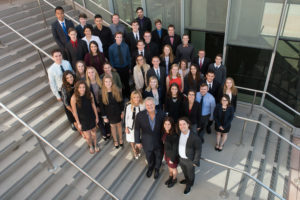
Now Quesada’s father’s health has stabilized, and she’s happy. Happy that her family won’t have to bear any burden from her education, happy that she’s able to focus on school and happy to now be studying at her “favorite place on Earth.”
Back at the luncheon, Quesada brought her story to a close, turning to Michael Smith, and his family.
“This has greatly impacted my life, and I still can’t believe that I can look at my parents and uphold my promise of graduating debt free and financially stress free,” she said.
Her voice lifted as she looked out toward her fellow students in the crowd.
“We represent the diversity in our school because there is not a single person here that has the same background and the same story.
“I am very thankful to have become a part of the wonderful community that has allowed for my dreams and career goals to come through. We are all incredibly blessed.”
How to make change
During Michael Smith’s first job out of Colorado State University there was no way he could have anticipated the events in his life that would lead to a career in oil and gas, let alone his return to CSU as a leader in the industry to deliver scholarships benefiting hundreds of students and their families.
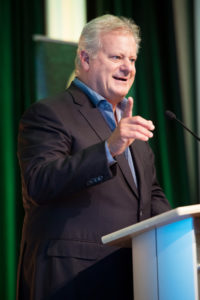
“As a student at CSU in the 1970s, I had no intention of getting into the energy business,” said Smith. “I knew nothing about oil and gas, and I thought that oil gushed out of the ground like I saw in the movies.”
He had become a successful real estate salesman, but knew he wanted a change. However, it wasn’t until Smith invested in his first oil well that he fell in love with the business.
“The well turned out to be extremely successful and it launched me into one of the greatest industries that anyone could spend a career in.”
When he first moved to Colorado from New York, Smith thought that the pumping jacks dotting the high plains were water wells until a CSU geology student explained the units were drawing oil from one of the largest fields in Colorado, the Spindle Field.
Undaunted by the unfamiliar, and fueled by his insatiable appetite for knowledge and a fierce work ethic, Smith began to seek out mentors who could help him understand the industry.
“I put in hours learning the business and read everything I could,” said Smith. “Everything I could get my hands on.”
“I literally learned the oil business by going out and watching wells get drilled, and in the oil business nothing happens during the day.”
Responding to phone calls in the middle of the night, Smith would slip his boots on and drive along dark and dusty roads to visit active oil sites, discovering how data was collected and observing the operations.
A new company, a new direction
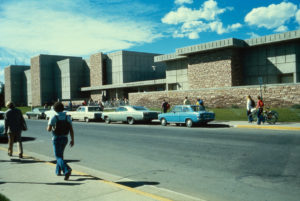
In 1981, Smith founded Basin Exploration to focus on drilling the new and emerging codell/niaera drilling play along the front range of Colorado. During a significant growth phase focused on drilling and acquisitions, the Spindle Field caught his eye.
“Ironically, I bought the whole field, all thousand plus wells that I once thought were water wells,” said Smith.
But by the mid-90s, things began to shift. Small independent companies were having success in the shallow waters of the Gulf of Mexico using 3D seismic data analysis that could now be processed at workstations by smaller independents. Previously, the technology required super computers that were only available to the majors and very large independents.
So Smith made the difficult decision to move his company from the Front Range to the Gulf of Mexico, completely revamping the management of his company and bringing on expert geoscientists.
The success Basin Exploration found in the Gulf boosted the value of the company from around $50 million to a sale value of $410 million just five years later.

Fast forward to present day and Smith is now the chairman and CEO of Freeport LNG, a liquefied natural gas company he founded in 2002.
Although decades had passed between the start of both companies, one thing stayed the same: change.
“How you respond to change will affect every one of you,” said Smith, addressing students during the scholarship luncheon.
In 2005, when Freeport LNG started construction on its $1 billion import terminal, demand for foreign gas was forecast to grow, but then a technological breakthrough changed everything.
The rapid expansion of horizontal drilling coupled with multi-stage fracturing brought a glut of new fuel to the U.S. market.
So Smith made a decision: “We switched.”
The company then began work on a $13 billion export facility to move the gas to foreign markets with great demand.
“I am not saying that change isn’t scary – it is – but each time I confronted it and pushed forward I was better for it.”